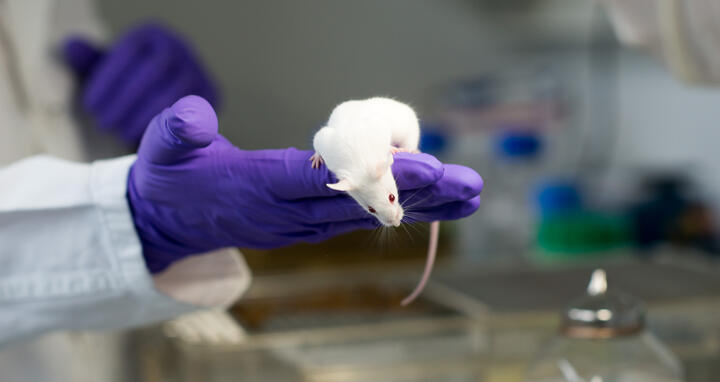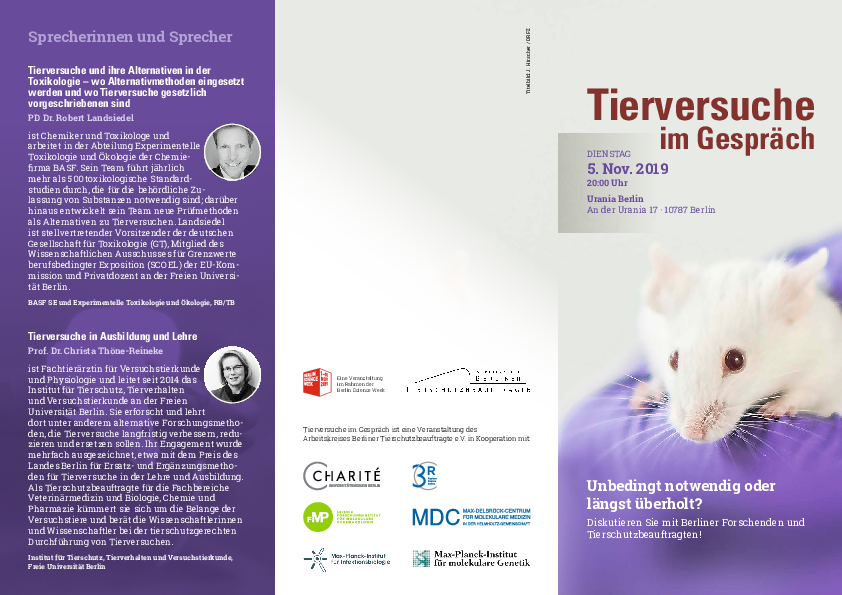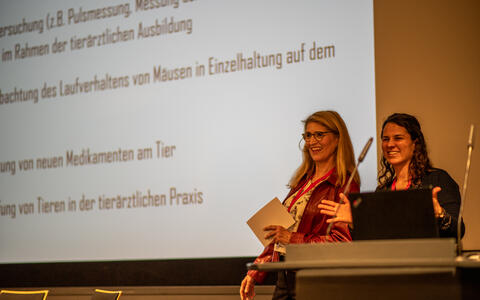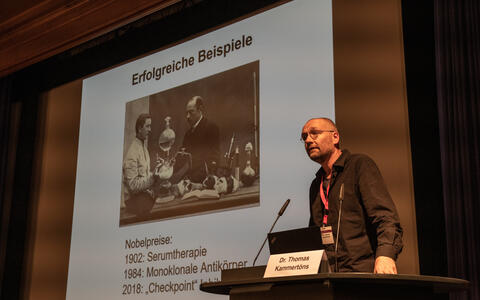“What if there was no more animal testing?”
Why is animal testing still practiced when so many alternative methods now exist? How are the animals treated? And who actually benefits from these experiments? There is huge public interest in the issue of animal testing, but an awful lot of myths still circulate on the subject. In a situation like this, first-hand information is vital – as are open and frank discussions.
Berlin’s animal welfare officers therefore decided to partner up with some of the city’s major biomedical research institutions to hold a new event as part of Berlin Science Week. Around 250 interested citizens, including schoolchildren and teachers, attended the evening discussion entitled “A conversation about animal testing – absolutely necessary or long outdated?” at the Urania theater in Berlin.
A trusting audience
The moderator of the evening, Berlin science journalist Lilo Berg, began by asking the audience how they felt about animal testing. Only around a dozen guests felt these experiments should be abolished entirely; roughly a third saw the need, but thought that too many tests were currently conducted on animals; and about two-thirds raised their hands in agreement with the statement: “I trust that scientists only conduct animal experiments when there are no other options.”
The next round of questions was on the popular topic of animal testing in the cosmetics industry. Public debates on this subject are often laden with misconceptions – and this evening was no different. Some guests were of the belief that authorization for animal experimentation depended on the type of cosmetic product being developed, or that cosmetics tested on animals abroad may be imported into the EU. But for some years now, any cosmetics that have been tested on animals are not allowed to be sold in the EU – even if they come from abroad.
Animal studies in veterinary medicine
Professor Christa Thöne-Reineke of Freie Universität Berlin explained the little-known fact that any training involving animals also falls under the category of “animal experiments.” As a specialist veterinarian for laboratory animal science, Thöne-Reineke’s work includes the training of veterinary and animal welfare personnel.
This training is based on the internationally recognized “3Rs principle” for experiments on live animals, which advocates the use of methods that are kinder to animals (refinement), that minimize the overall number of animal experiments (reduction), and that always consider alternatives to the use of animals (replacement). Christa Thöne-Reineke is also involved in the graduate program of the Berlin-Brandenburg research platform BB3R – the first graduate program in the world dedicated to research into animal testing alternatives. This platform is part of Freie Universität Berlin and a partner in the Charité 3R network – an initiative founded in 2018 to anchor the 3Rs principle in research and practice. The professor already uses a number of alternative methods in her courses, including online tutorials, models, and simulators. Thöne-Reineke said: “As long as the law continues to classify the training of animals as animal experiments, we cannot abolish animal experiments in veterinary training.”
Animals are also used in basic research
Professor Anja Hauser, veterinarian and immunologist at the German Rheumatism Research Center Berlin (DRFZ) and Charité, and Dr. Thomas Kammertöns, immunologist at the Max Delbrück Center for Molecular Medicine and Charité, explained why animal studies are currently indispensable for basic and clinical research.
Both researchers said that experiments in cell cultures or on organoids are suitable for gaining initial insights, but that the complex processes in the immune system, in which many cell types in different organs interact with one another, can only be observed in the entire organism. Anja Hauser described how research on mouse models has led to a new drug that helps some patients suffering from multiple sclerosis. Thomas Kammertöns, meanwhile, is currently using mouse models to develop a new cancer therapy that stimulates the body’s own immune system to fight tumor cells.
A faster road to alternatives
Robert Landsiedel is developing alternative methods to replace the animal experiments currently required by government regulatory agencies to test the safety of chemicals. The chemist and toxicologist leads a large research team at the Ludwigshafen-based chemical company BASF.
At present, it often takes up to ten years for an alternative method to be recognized by the authorities as a suitable substitute. “If we continue with the current approach, it will take more than a hundred years before all regulatory animal experiments in the toxicological testing of chemicals can be replaced,” Landsiedel said. He recommended that the recognition of alternative methods be simplified and that priorities be set for the future development of alternative methods.
The lively discussion focused mainly on alternative methods to animal testing and questions concerning the keeping of laboratory animals. In response to the public’s question, “What happens when an animal study is approved – do scientists then have free rein?”, the experts on the panel described the strictly regulated and meticulously documented procedure in which precise records must be kept for each individual animal. “And what would happen if animal testing was banned overnight?” asked another audience member. Then no new drugs or chemical substances could be approved, answered the panel, because animal studies are required by law and are still necessary. After the official end of the event, the discussion continued in a more relaxed setting over pretzels and beer – around the well-visited information stands of the Working Group of Berlin Animal Welfare Officers.









